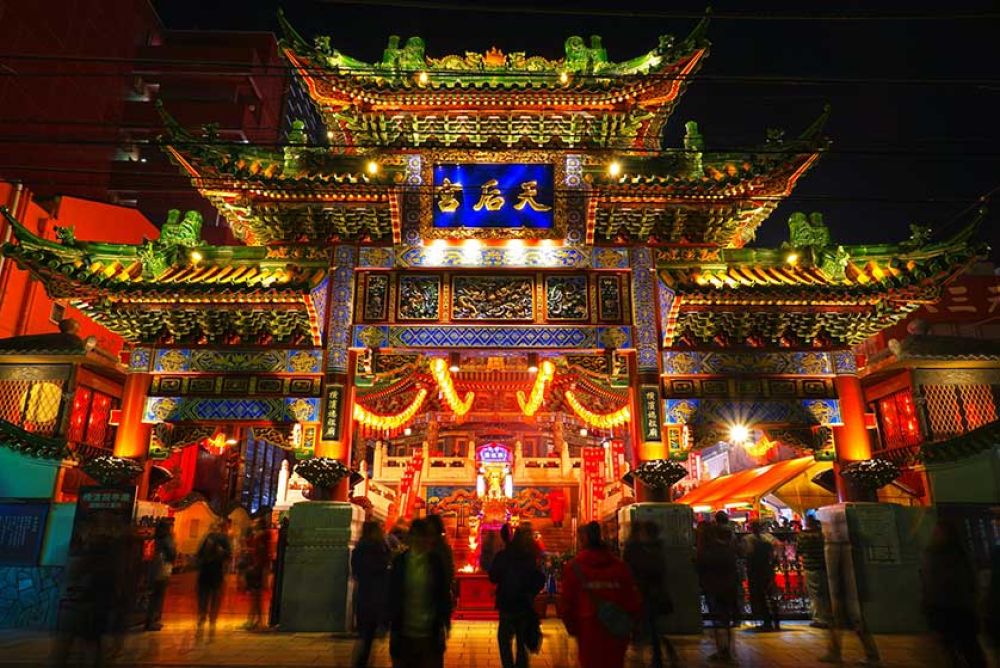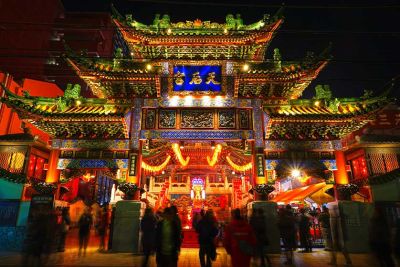

Visitors to Yokohama Chinatown can experience the rich cultural heritage of China by visiting the Kanteibyo (Guan Di Miao) Temple. This vibrantly colored temple is dedicated to Guan Yu, a famous general in Chinese history who symbolizes loyalty and righteousness. The temple's intricate architecture, with its ornate carvings and detailed sculptures, is a testament to traditional Chinese design. Visitors are welcomed by a majestic pair of stone lions guarding the entrance, and as they walk through the temple’s precincts, they are enveloped in a serene atmosphere that stands in stark contrast to the bustling streets outside. Red lanterns adorn the temple, casting a warm glow over the worshippers and tourists alike. Kanteibyo Temple is not only a place of worship but also a cultural landmark, playing a pivotal role during festivals and celebrations such as Chinese New Year. A visit to this temple is a visual and spiritual treat, offering a glimpse into the cultural heart of Yokohama Chinatown.
A visit to Yokohama’s Chinatown is incomplete without indulging in its famous street food. Embark on a mouth-watering journey through the narrow alleys lined with food stalls and restaurants offering an array of Chinese culinary delights. This street food tour lets you taste a variety of dishes such as nikuman (Chinese-style steamed buns), shumai (steamed dumplings), and tangbao (soup-filled buns), giving you an authentic flavor of China's diverse gastronomy. Each stop introduces visitors to traditional recipes handed down through generations, prepared with fresh, local ingredients. The aroma of spices and the sight of skilled chefs at work create a multisensory experience. As a part of this guided tour, visitors also learn about the history and culture behind the foods they taste. From savory treats to sweet desserts, your taste buds are bound to embark on an unforgettable adventure.
Exploring Yokohama Chinatown through the Panda Bus tour is an excellent way for visitors to enjoy the sights and sounds of this vibrant neighborhood. The open-top, double-decker bus is themed around the beloved panda and offers a hop-on, hop-off service, allowing guests the flexibility to explore the attractions at their own pace. From the comfort of their seat, passengers can admire the colorful streets, bustling markets, and historical buildings. The tour provides informative commentary on landmarks and the history of Chinatown, which has been a prominent fixture in Yokohama since the city’s port was opened to foreign trade. Ideally suited for families and those with limited mobility, the Panda Bus tour provides a comprehensive and leisurely overview of Yokohama's Chinatown, ensuring no sight is missed. Whether it’s a sunny day or a starlit evening, this tour is a delightful way to experience the area's lively ambiance.
Masobyo Temple, a relatively recent addition to Yokohama Chinatown, is dedicated to the sea goddess Mazu and attracts visitors with its striking architecture and serene atmosphere. Erected in 2006, it stands out with its bold hues and gracefully curved rooftop adorned with intricate carvings and statuary. As patrons step inside, they're greeted by the sight of beautifully painted walls and ornamental decorations that combine both traditional and contemporary artistic styles. Known for its tranquil environment, Masobyo Temple serves as a spiritual oasis amidst the hustle and bustle of the city. It offers a unique experience for those seeking quietude or spiritual respite, providing insight into Chinese folk religion and its practices. A visit here not only soothes the mind but also allows for reflection on the maritime heritage that has shaped Yokohama's identity over the centuries.
Yokohama Daisekai is an entertainment and shopping complex that provides a vibrant cultural experience. Spread out over eight floors, this building is a haven for shoppers and those interested in traditional Chinese arts and crafts. Here, vividly colored kites, elegant silk garments, intricate jewelry, and a variety of other treasures await eager buyers. The complex also houses theme-based zones, including Dong Bei Mama, which offers an interactive experience showcasing the charm of northeastern China. Visitors can try their hand at Chinese calligraphy, dress up in traditional clothing for photos, or watch artisans at work. The complex also features a range of dining options where visitors can relax and enjoy Chinese teas and delicacies. Yokohama Daisekai is a must-visit for anyone looking to take a piece of Chinatown home with them while enjoying an immersive cultural exploration.
Yokohama Ma Zhu Miao, another temple dedicated to the deity Mazu, stands as a symbol of the city's strong ties to the sea and its Chinese community. Known as the protector of seafarers, Mazu is revered at this temple which features traditional Chinese palatial architecture. The temple's ornate design and vibrant colors provide a visually stunning experience. Upon entering, the fragrance of incense and the sound of prayer create a calming ambiance that transports visitors away from the fast pace of the surrounding city. Devotees come to pray for safe passage and good fortune, while tourists can revel in the intricate details, including the beautifully carved panels and statues. The atmosphere is one of reverence and peace, offering a space for contemplation and an opportunity to learn about Chinese religious customs and their influence on local culture.
Experiencing Chinese New Year in Yokohama Chinatown is an event not to be missed. As the most important holiday in Chinese culture, the area comes alive with decorations, lion dances, dragon parades, and fireworks. The streets are adorned with red lanterns and traditional couplets, creating a festive atmosphere that envelops the entire district. Visitors can witness performances by dancers and martial artists, who bring folklore and legends to life. Spectacular displays of firecrackers and the vibrant colors of costumes captivate both young and old. Stalls lining the district offer festive foods and souvenirs that embody the spirit of renewal and good fortune. The Chinese New Year Festival is a time of joyous celebration, providing a unique cultural experience that blends traditional Chinese customs with the modern energy of Yokohama Chinatown. It's an enriching opportunity to join in the festivities and start the year on a high note.
When night falls on Yokohama Chinatown, the area transforms into an illuminated wonderland. The streets and temples are lit up with elaborate light displays that create a magical and enchanting environment. Specialty lighting highlights the architecture of the temples, casting intricate shadows and showcasing their artistic beauty. Meanwhile, the streets shimmer with strings of lights and paper lanterns, guiding visitors through the vibrant neighborhood. Walking through Chinatown during the illumination hours offers a feast for the eyes and a romantic backdrop for an after-dinner stroll. Seasonal events, such as the Mid-Autumn Festival, come with their own unique light installations that add to the festive mood. The illuminations are a testament to Chinatown's commitment to celebration and beauty, providing a memorable experience for all who visit after dusk.
The Hankai Temple in Yokohama Chinatown is a lesser-known gem that offers a peaceful retreat from the energetic streets. This small yet significant temple belongs to the Chinese Buddhist tradition and features architecture that is both simple and profound. Existing in harmony with the neighboring buildings, the temple's atmosphere is one of quiet dignity and contemplation. Visitors can appreciate murals and statues that depict scenes from Buddhist lore, learn about the life of Buddha, and observe the prayer rituals of the faithful. The temple also plays a role in local religious events and is a focal point for the observance of traditional Buddhist holidays. It is a place where one can immerse oneself in spiritual exploration or simply enjoy a moment of respite amidst the charm of Chinatown.
A traditional Chinese tea ceremony is a profound cultural experience that visitors to Yokohama Chinatown can enjoy. This ceremony, known as 'gongfu cha', is an intricate and meditative process that emphasizes the art of tea preparation and serving. At various tea houses in Chinatown, guests can participate in this ritual guided by experienced practitioners. During the ceremony, participants learn about the different types of teas, their histories, and their distinctive brewing techniques. Each movement is purposeful and graceful, reflecting the philosophy that making and drinking tea is a form of meditation and a pathway to mindfulness. The tea ceremony is not only a chance to taste exquisite teas but also an opportunity to slow down and savor the moment—a cultural and sensory journey that embodies the spirit and traditions of China.
